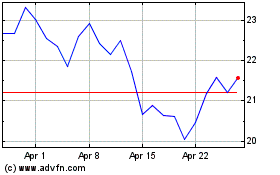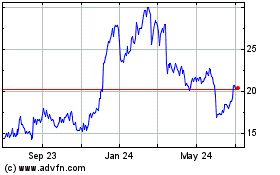OneWeb, an affiliate of the Japanese group, to buy Intelsat in
bid for wider internet access
By Andy Pasztor and Mayumi Negishi
Japanese telecom company SoftBank Group Corp. is orchestrating a
deal between U.S. satellite startup OneWeb Ltd. and debt-laden
satellite operator Intelsat SA in an attempt to deliver faster and
cheaper internet connections world-wide.
OneWeb, which is 40%-owned by SoftBank, Tuesday said it would
buy Intelsat, combining two very different types of satellite
fleets that would offer low-cost, versatile connectivity spanning
the globe. As part of the deal, SoftBank will inject $1.7 billion
into the combined company, in which it will hold a 40% stake.
The deal, which is subject to approval by Intelsat bondholders,
would lower Intelsat's roughly $14.5 billion debt by about $3.6
billion, while allowing OneWeb to further expand its ambitious
satellite-production and deployment plans in the next decade.
The combination comes amid escalating efforts by other tech
giants to find the recipe for ubiquitous internet links in the sky.
Facebook Inc. is developing a high-altitude, solar-powered drone,
called Aquila, to provide web access to remote locations. Alphabet
Inc.'s Google is working on high-altitude balloons, dubbed Project
Loon, and specialized satellites. Even Boeing Co, which in the past
resisted the trend toward small satellites, is pursuing plans to
possibly launch its own downsized fleet.
SoftBank, which runs a major cellphone provider in Japan and
controls Sprint Corp. in the U.S., is chasing new deals as it seeks
to control technologies it sees as essential in an age of increased
connectivity, automation and artificial intelligence.
Last year, it closed a $32 billion deal to buy U.K. chip
designer ARM Holdings PLC, a key supplier of chip architecture for
cellphones. ARM aims to double the number of its engineers in five
years to accelerate research in areas such as chip security and
robotics.
SoftBank Chief Executive Masayoshi Son is preparing to open a
$100 billion fund, with the backing of Saudi Arabia's
sovereign-wealth fund and other partners, in an attempt to become
the world's biggest investor in technology over the next
decade.
The proposed deal between OneWeb and Intelsat would be a major
departure from the traditional way satellite-service providers have
operated. It would feature a hybrid fleet of large Intelsat craft
operating at high altitudes and eventually perhaps more than 2,500
smaller satellites circling much closer to the Earth.
The move is the latest marrying a startup space company with a
more established player at a time many incumbent satellite-services
companies are struggling with a capacity glut that is weighing on
earnings. Luxembourg's SES SA last year agreed to buy all of O3b
Networks Ltd. OneWeb's founder, Greg Wyler, also founded and serves
as executive chairman of O3b.
For Intelsat, which has been struggling under a heavy debt load
and sluggish growth, the proposed deal amounts to a lifeline to
reinvigorate its offerings by teaming up with a more-nimble
partner.
Intelsat has weathered a string of acquisitions and leveraged
buyouts stretching back more than a decade. Several private-equity
firms acquired the company in 2004 for $3.1 billion. Four years
later, a different set of private-equity partners closed a deal for
the company relying on only $5 billion of equity and the assumption
of more than $11 billion of debt. Recently, Intelsat's management
has been seeking strategies to manage its debt and boost sales.
Stephen Spengler, Intelsat's chief executive, described the move
as "an acceleration of the plans of both companies." He said
Softbank's agreement to inject $1.7 billion into the new entity
wasn't intended to underwrite the proposed fleet expansion.
But by paring debt and capitalizing on some of OneWeb's assets,
Mr. Spengler envisions offering customers more options as data
rates and user patterns shift around the world.
"We need to bring multiple solutions to the table" to persuade
customers the combined fleets offer long-term stability under
fast-changing conditions, he said during a call with analysts hours
after the announcement. With annual revenue projected to stay at
roughly $2.1 billion for 2017, Mr. Spengler said Intelsat also
would benefit from foregoing some capital expenditures, But company
officials said it was too early to release specifics.
Building, testing and launching large commercial-communications
satellites that hover over a specific spot on the Earth can cost
hundreds of millions of dollars and take several years from the
time designs are started.
By contrast, OneWeb projects initially assembling its satellites
over a matter of days -- and eventually in less than 24 hours -- at
a cost below $1 million apiece.
Pending approvals by bondholders and regulators, Mr. Spengler is
slated to be chief executive and Mr. Wyler executive chairman of
the combined company.
The deal's goal is to unlock new applications and markets,
including faster and less-expensive internet links for mobile
devices and homes and business in developing regions. By building
on OneWeb's technical advances and Intelsat's experience serving
mature and emerging areas, the transaction provides "an opportunity
to utilize" diverse assets and "create something that is larger
than the individual companies," Mr. Wyler said in an interview.
He also said OneWeb's existing partners, including Airbus SE,
unanimously back the deal. The announcement comes barely days
before a joint venture between OneWeb and Airbus is scheduled to
break ground to construct a cutting-edge automated factory in
Florida intended to assemble satellites faster than any other
facility in the world. The venture has projected building some 600
modular satellites and starting initial service by 2019.
The two satellite fleets won't be able to directly hand off
signals to each other. But the combination would mean tailoring
capacity from each system to most effectively serve different types
of markets.
Industry officials consider large, highflying systems better
able to satisfy extensive demand in urban areas, partly because
individual satellites have unmatched power and capacity.
Constellations of smaller spacecraft such as the OneWeb plans to
put up, however, cost less and typically have shorter lag times
between transmissions from space and reception of signals on the
ground. They often are preferred for serving dispersed demand over
less populated areas.
In a speech in London last week, Mr. Wyler told reporters that
OneWeb was leaning toward building and deploying a
second-generation fleet, potentially comprising another 2,000
additional, higher-capacity satellites by 2027, partly reflecting
SoftBank's vision of expanded capacity.
--Robert Wall contributed to this article.
Write to Andy Pasztor at andy.pasztor@wsj.com and Mayumi Negishi
at mayumi.negishi@wsj.com
(END) Dow Jones Newswires
March 01, 2017 02:49 ET (07:49 GMT)
Copyright (c) 2017 Dow Jones & Company, Inc.
SentinelOne (NYSE:S)
Historical Stock Chart
From Mar 2024 to Apr 2024

SentinelOne (NYSE:S)
Historical Stock Chart
From Apr 2023 to Apr 2024
